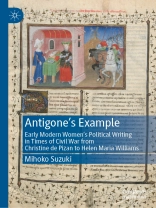This book investigates early modern women’s interventions in politics and the public sphere during times of civil war in England and France. Taking this transcultural and comparative perspective, and the period designation “early modern” expansively, Antigone’s Example identifies a canon of women’s civil-war writings; it elucidates their historical specificity as well as the transhistorical context of civil war, a context which, it argues, enabled women’s participation in political thought.
2023 Book Award (Scholarly Monographs), Society for the Study of Early Modern Women and Gender.
Mihoko Suzuki’s Antigone’s Example is an extraordinary account of political writings by women in France and England from the late Middle Ages to the early nineteenth century. Crossing the usual boundaries of periodization and nation, Suzuki explores the continuities in how early modern women responded to civil war, as extreme situations enabled and compelled women to write in defense of their families and communities and thus gain a voice in a public sphere that normally excluded them. Whatever side they were on, they presented themselves as mediators, much like Antigone, whose example, Suzuki writes, represented a model of female defiance and political agency. This insightful book opens up fresh perspectives on canonical writings and brings relatively neglected writings to the reader’s attention, showing the importance of transnational study of early modern women.
Recipient of 2023 Book Award, Society for the Study of Women and Gender
表中的内容
Introduction: Antigone’s Example.- 1. Christine de Pizan’s Political Thought and Civil War.- 2. Female Subjects as Counselors to Queens: Anne Dowriche, Mary Sidney, Elizabeth Cary.- 3. Politics, History, and the Fronde: Motteville, Montpensier, Longueville, Nemours.- 4. Margaret Cavendish’s “French Connection” and Civil-War Political Writing.- 5. Post-Restoration Civil-War Writings: Katherine Philips, Aphra Behn, Jane Barker.- 6. Writing, Activism, and the French Revolution: Louise de Kéralio, Stéphanie de Genlis, Germaine de Staël.- Epilogue: Helen Maria Williams, Citizen of the World.
关于作者
Mihoko Suzuki is Professor of English and Cooper Fellow in the Humanities Emerita, at the University of Miami, USA.












